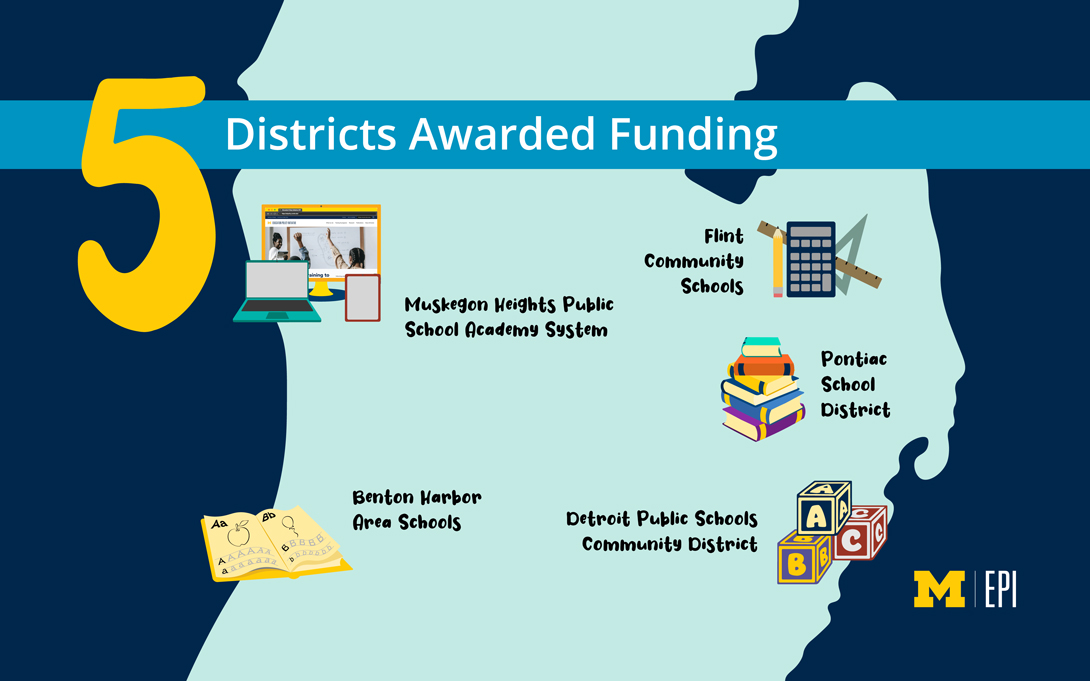
Improving literacy outcomes for children is critical to students’ academic success as well as their career and life outcomes. Michigan's Top 10 Strategic Education Plan (SEP) aims to provide focused direction to Michigan's education community in support of all learners. The plan sets state educational goals and establishes associated metrics and is intended to have a significant positive impact on Michigan’s more than 1.4 million schoolchildren.
In pursuit of the second goal in the SEP, to improve early literacy achievement, MDE applied for and was awarded a $15 million grant by the U.S. Department of Education to support the implementation of Comprehensive Literacy Plans (CLP) in local districts. The grant supports the implementation of CLPs that span the continuum of learners from birth to grade 12.
The Michigan Comprehensive Literacy State Development (MiCLSD) Grant is designed to increase children’s literacy rates across all ages from birth to grade 12. The grant’s overall goal is to “Improve literacy outcomes for all children, especially children who are living in poverty, are English language learners, and/or are students with disabilities, particularly those located in Qualified Opportunity Zones.” It will enable districts to leverage existing community relationships and establish a broader literacy learning network across the state, allowing the districts to better serve children. The state has awarded the grant funds to five local school districts - Benton Harbor Area Schools, Pontiac School District, Flint Community Schools, Muskegon Heights Public School Academy System, and Detroit Public Schools Community District.
As a part of this project, the University of Michigan was awarded a $170,000 grant over five years to evaluate these districts’ progress throughout the grant term. Led by Brian Jacob of the Education Policy Initiative (EPI) at the Gerald R. Ford School of Public Policy, the University’s evaluation will focus on how districts and the organizations they collaborate with design and implement their Comprehensive Literacy Plans. EPI project manager Jasmina Camo-Biogradlija and MPP candidate and research assistant Alex Baum.
The state awarded funds to these five districts that demonstrate the highest potential benefit from literacy interventions, as they serve high proportions of student populations considered a priority under the grant. With these funds, the districts will develop a CLP, strengthen connections across the birth to grade 12 (B-12) learning continuum, and create an “educational and professional development literacy system.”
“We can learn a lot about what can work across the state by closely examining the impacts of these CLPs in the targeted school districts. We hope this evaluation will help the state implement the transformative literacy developments for all learners,” says Jacob.
Partner organizations will collaborate with school districts to provide evidence-based programs and services to improve children’s literacy, from teacher training, to K-3 reading intervention programs, to family engagement supports. Districts also receive support and professional development from Michigan’s MTSS Technical Assistance Center.
The University’s evaluation efforts were kicked off in 2020-21 by the work of a Ford School Master of Public Affairs (MPA) graduate student, Stephanie Iovan (MPA ‘21), who collaborated with MDE officials in the early stages of the project and hopes that the next stage of the work will “reveal both strengths and gaps in Michigan’s education policy and can guide the important work of future education policy analysis in the state,” she says.
Going forward, the University will study how districts spend their allocated funds and make progress toward the grant objectives. It also will perform a comprehensive evaluation to understand the collaboration between schools and community partners, teachers’ instructional approaches, changes in children’s literacy outcomes, and more.
This evaluation is part of an ongoing research partnership between the State of Michigan and the University of Michigan. The University will support MDE for the duration of the five-year grant. “The project leverages numerous existing organizations, groups, and resources to streamline delivery of literacy instruction and increase implementation of evidence-based practices. The findings from this evaluation will be used to help local school districts around the state improve their literacy programming,” says Shelly Proebstle, Literacy Manager at MDE.
This article was written by Alex Baum
More news from the Ford School